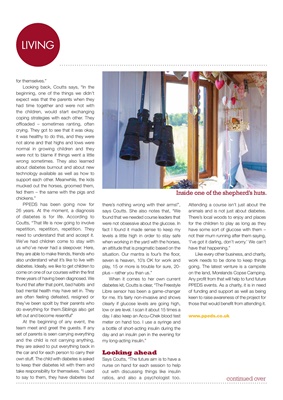
LIVINGLIVING
The children come to work with the
horses, but at the same time learn
about living with diabetes. - Kerie
Coutts
"
A view of the inside of the converted pig hut.
Lessons were learned by the team over
time, and the events, courses, education,
enlightenment - whatever you call it,
threw up some interesting aspects. "We
began to understand that we needed to
stop the parents from interfering, doing
things for their kids - they needed to do it
for themselves."
Looking back, Coutts says, "In the
beginning, one of the things we didn't
expect was that the parents when they
had time together and were not with the
children, would start exchanging coping
strategies with each other. They offloaded
- sometimes ranting, occasionally crying.
They got to see that it was all okay, it was
healthy to do this. Meanwhile, the kids
had to muck out the horses and had to
groom them."
PPEDS has been going now for
26 years. At the moment, a diagnosis
of diabetes is for life. According to
Coutts, "That life is now going to involve
repetition, repetition, repetition. They
need to understand that and accept it.
We've had children come to stay with
us who've never had a sleepover. Here,
they are able to make friends, friends who
also understand what it's like to live with
diabetes. Ideally, we like to get children to
come on one of our courses within the
first three years of having been diagnosed.
We found that after that point, bad habits
and even a bad attitude may have set
in. They often feel defeated, resigned or
they've been spoilt by their parents who
do everything for them."
At the beginning of any event, the
team meet and greet the guests. If any
set of parents is seen carrying everything
and the kid is not carrying anything, they
are asked to put everything back in the
car and for each person to carry their own
stuff. The child with diabetes is asked to
keep their diabetes kit with them and
take responsibility for themselves. "I used
to say to them, they have diabetes but
there's nothing wrong with their arms!",
says Coutts. She also notes that, "We
found that we needed course leaders that
were not obsessive about the numbers,
the factor that I found it made sense to
keep my levels a little high in order to
stay safe when working in the yard with
the horses, an attitude that is pragmatic
based on the situation."
Looking ahead
Says Coutts, "The future aim is to have
a nurse on hand for each course to help
out with discussing things like insulin
ratios, and also a psychologist too.
Attending a course isn't just about the
animals and is not just about diabetes.
There's local woods to enjoy and places
for the children to play as long as they
have some sort of glucose with them -
not their mum running after them saying,
'I've got it darling, don't worry.' We can't
have that happening."
Like every other business, and charity,
work needs to be done to keep things
going. The latest venture is a campsite
on the land, Morelands Copse Camping.
Any profit from that will help to fund future
PPEDS events. As a charity, it is in need
of funding and support as well as being
keen to raise awareness of the project for
those that would benefit from attending it.
www.ppeds.co.uk
continued over